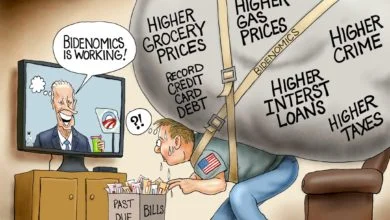Washington woefully misunderstands healthcare economics
It appears that some in Washington just don’t understand the basic economics of the healthcare industry.
Government meddling in markets has driven up the cost of healthcare and created a situation where many of our nation’s hospitals are closing because they can no longer afford to treat patients. Since January 2005 nearly 200 rural hospitals have closed, leaving many communities without access to care, while hundreds more are currently experiencing financial losses on patient services. This is not a sustainable trend.
Unfortunately, instead of taking steps to alleviate this concerning state of play, Washington appears to be taking the opposite approach. Heavy-handed oversight from big government bureaucrats at the Federal Trade Commission (FTC) and a new legislative push from Senator Bernie Sanders threaten to force a new round of hospital closures that may make it more difficult for Americans to find places to receive the treatment that they need.
In response to the long-term financial headwinds facing hospitals, many have chosen to merge to weather the storm. Since 2005, more than 380 rural hospitals merged together, and these merged rural systems closed less frequently than their stand-alone counterparts. But in 2021 President Joe Biden ordered the FTC and other federal agencies to promote his version of “market competition” in health care and other industries. Biden argued, incorrectly, that consolidation left many areas, particularly rural communities, with inadequate or more expensive healthcare options.
FTC Chair Lina Khan has taken this task to heart and has been hyper-vigilant in her efforts to limit healthcare consolidation. Usually, such consolidations are judged on metrics such as consumer injury, but a host of research has dispelled this concern. Not only do savings from such industry realignments appear to be passed on by hospitals, but data shows significant improvements in key indicators of patient care quality, including readmission and mortality rates.
Despite such compelling evidence, Biden appointees at the FTC blocked 4 hospital mergers in a little over a year and are primed to fight many more. In fact, bureaucrats at the agency have said they feel invigorated “to be aggressive on antitrust enforcement” in light of the executive order, continuing to meddle in healthcare markets to the detriment of patients and providers. This is a concerning development for financially struggling medical facilities that may be counting on such broader industry shifts to keep their doors open.
Not to be outdone, Sanders recently introduced a bill that would expand a tool known as site neutral payments, which would in effect impose artificial government price controls in the healthcare market. Used by the Centers for Medicare & Medicaid Services (CMS) to limit the payments made by Medicare and Medicaid to hospitals, site neutral payments set one reimbursement rate for procedures regardless of the kind of facility in which they were performed.
This apples-to-oranges comparison ignores market dynamics and fails to account for the vastly different operating costs incurred by physicians’ offices and hospitals, which by the very nature of the way that they operate, are much more expensive to run. Smaller, independent medical providers such as physicians’ offices regularly only employ a few people, other than the doctor, have set hours of operation, and provide limited onsite treatment options. Hospitals on the other hand are relied upon 24 hours a day, 7 days a week, and employ doctors, nurses, and administrative staff around the clock. They also house the necessary equipment for all types of treatments and procedures that independent physicians don’t have at their offices, all of which increase the cost of care.
Ignoring these differences and imposing de facto price controls on medical treatment would likely increase the payment gap government run health insurance programs have already created for hospitals which, on average, only receive 87 cents for every dollar they spend caring for Medicare and Medicaid patients, exacerbating this already tenuous financial situation and leading to more hospital closures.
Such regulatory actions and legislative proposals demonstrate just how out of touch some in Washington are with regard to healthcare markets. Instead of onerous regulation and heavy-handed price controls, regulators and legislators should do more to allow market forces to respond to current misalignments in the healthcare industry.
Agree/Disagree with the author(s)? Let them know in the comments below and be heard by 10’s of thousands of CDN readers each day!




